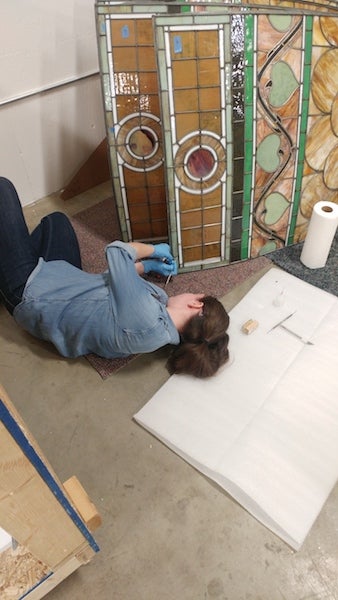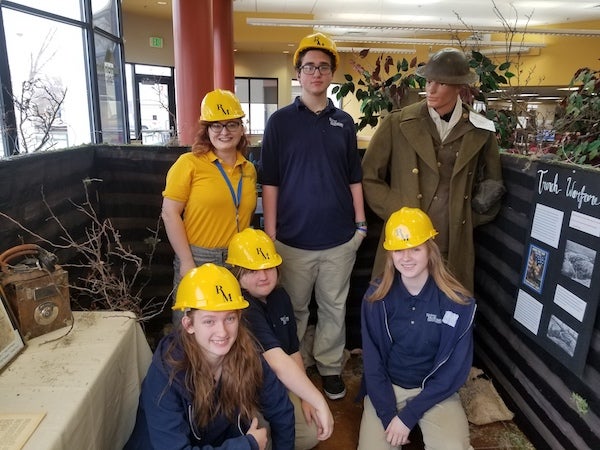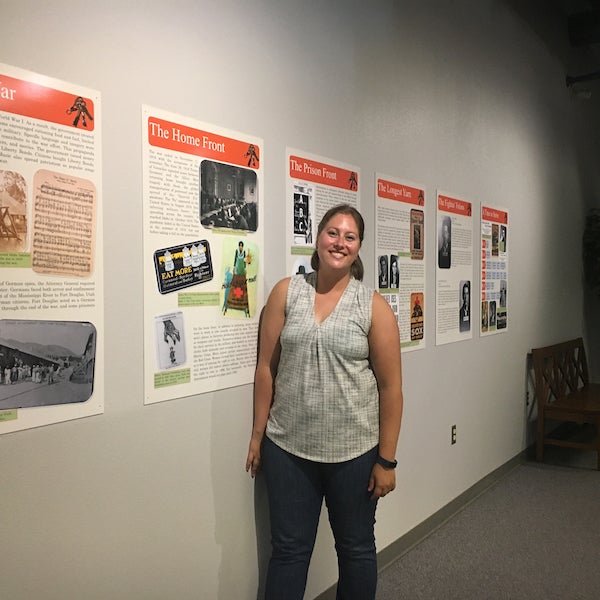
Bob Reinhardt is on a mission: helping people who love history find meaningful work.
“There are so many ways of fulfilling that passion,” said Reinhardt, an assistant professor and internship coordinator in the Department of History.
Before coming to Boise State, Reinhardt was the executive director of the Willamette Heritage Center in Salem, Oregon, a complex of 14 historic buildings on five acres that includes exhibits, event spaces and educational programs. He recently founded the Working History Center, a campus initiative to demonstrate the relevance of history as a way of “thinking and working and doing in the world.”
The center raised $1,200 in donations on Bronco Giving Day, Sept. 13. That, plus matching funds from the College of Arts and Sciences, will support the center’s “signature event,” the Working History Showcase in the spring.
Reinhardt describes the showcase as a “combination speed-networking session for history students and history professionals, and a bragging show for what they do outside of a classroom.” Participants will include local historians who work in public policy, planners, historians who work for state and city libraries and nonprofits, and consultants who own businesses related to the history field.
Hayley Noble, who received her undergraduate degree in history from Boise State and her master’s degree in applied historical research, applauded Reinhardt’s efforts. He connects academia and the community, “making real history professionals tangible people that you can ask about their work, how they got there, and that being a historian is a real ‘thing,'” said Noble.
The Working History Center has an advisory board in place. Most of its members are graduates of Boise State’s history programs, including HannaLore Hein, state historian with the Idaho State Historical Society; Eric Forsch, business retention and expansion manager with Idaho Commerce; and Stephen Hunt, a principal planner with Valley Regional Transit.
Hunt graduated from Boise State in 2003 with a double major in history and German. His study of the French Revolution and the transformation of Parisian streets into wide boulevards that “let the city breath” while letting military troops move more freely sparked what’s become a lifelong interest in transportation.
“The built environment has an impact, not only on what you see but on how you live your life, how communities develop, and why cities grow in the places they do. Much of that has to do with transportation,” said Hunt. “I found my profession through history.”
After Boise State, Hunt received his master’s degree in urban planning from the University of Illinois in Chicago. He developed an appreciation “for models and statistics,” but it was his early studies of history that gave him a broad perspective on the world. His graduate school professors consistently told him he approached problems from angles that many of his peers from engineering and related fields did not.
“The skills you learn in the history discipline are useful in many other fields,” said Hunt. “Rather than trying to get history students into business class, we should get business students into history class.”
The Working History Center will continue to evolve, said Reinhardt. Future projects could include graduate students exploring a locally relevant theme for an entire year and writing white papers on current issues facing Idahoans. The center could become a trusted resource for those in the community, including members of the media, looking for information on historic topics.
“We want to change peoples’ understanding of what they think of when they think of history, and see history as something vital and relevant,” said Reinhardt.
Skills, like making convincing arguments and critiquing ideas – so inherent to the study of history – will never be obsolete in the workplace, he added.
Internships lead to careers
In addition to growing the Working History Center, Boise State’s history department will continue to strengthen its internship program for history students. Currently, six students are serving internships. Over the years, the department has partnered with many organizations, ranging from the Idaho Transportation Department to the Idaho State Historic Preservation Office, to the Sawtooth Interpretive Historical Association and the Minidoka National Historic Site.
Calista Houdek received her degree in history in 2018 and interned at Boise High School. Her assignment: organizing the archives of the century-old institution. The daunting task involved throwing out some things – a recycling display made of trash that was impossible to preserve. It involved rescuing others – yearbooks from 1918 buried under file folders and paper.
“I’m a military brat,” said Houdek, who was born in Florida and moved to Boise in 2013. “I’ve moved a lot. I’m used to culling.”

Houdek was able to use materials she found at Boise High to inform her senior project, which looked at changing fashions at the school and their relation to historical happenings like the Great Depression. She got a job just months after graduation, as one of four teachers at Richard McKenna Charter School in Mountain Home. She lives there, in a former Basque hotel built in 1910.
“It’s one of the city’s historic landmarks. It’s super-haunted and perfect for a historian,” she said.
At school, she has the freedom to design her own curriculum that includes world and American history. She designed a project for students to create an exhibit based on the history of World War I in Mountain Home, which was displayed in the city’s historical museum. As for the value of studying history, her answer is different any time anyone asks the question, she said.
“In any career – medicine, politics, science – there is history. You have to know where have we come from to know what we’ll become,” she said.
One of Reinhardt’s challenges as internship coordinator is helping students who are unable to take unpaid internships because of their financial obligations. The Working History Center will provide stipends for students who want to work with institutions that can’t pay them. The donation also will provide a cash award for the Most Valuable Intern.

Hayley Noble is the most recent recipient of the award. Noble completed three internships during her time at Boise State with the Idaho Military Museum, the Boise City Department of Arts and History, and the Old Idaho Penitentiary. Her internship at the Old Pen coincided with the 100th anniversary of the WWI Armistice. Working mostly independently, Noble created an exhibit about the prison during wartime. That led to giving a talk at Boise High and being part of a segment on Boise State Public Radio’s program Idaho Matters. Noble is now a full time staff member at the Old Pen, “getting paid to research and give tours, which is amazing,” she said.
She credits the internship program for much of her success.
“I feel strongly about getting historians out of the classroom and into the field. Hands-on experiences in job situations are much more beneficial ultimately when looking for a job,” said Noble. “There’s only so much you can learn in a classroom, especially when dealing with public history.”
More about Noble’s Old Pen exhibition: https://hayleymnoble.wixsite.com/hnoble/project02
– Story by Anna Webb